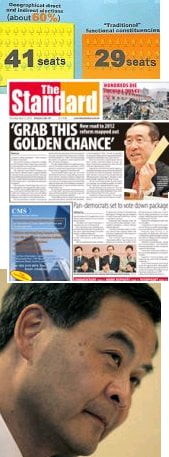The Chinese government, working through its local proxy, unveils the take-it-or-leave it ‘reform’ package for the election of Hong Kong’s Chief Executive and Legislative Council in 2012. Despite an intervening period of public consultation, it is no different from the proposal put forward last November, which itself was barely distinguishable from the one proposed for the 2007-08 polls, which was vetoed by pro-democracy legislators in 2005 on the grounds that it contained no meaningful change from the 2004 arrangements.
Under this package, the method for electing the Chief Executive in 2012 would be the same old Election Committee farce under which a small group packed with loyalists goes through an elaborate charade of nominating and then voting for the person already chosen by Beijing. The rubber-stamp body would simply undergo a cosmetic increase in size.
The proposed system for electing the 2012 Legco involves the addition to the chamber of 10 new seats: half geographical, half functional – but with the latter elected by all popularly elected district council members. After some slight tinkering with the 2005 formula, which would have allowed the appointed (pro-government) district councilors to vote, this could yield pro-democrats maybe an extra seat or so in the largely toothless legislature.
Cynics who doubt whether our leaders even want this proposal passed are probably wrong: Hong Kong and even mainland officials are vigorously talking it up, as are the pro-establishment media. Beijing seems to find the pro-democrats’ rejection of political reform measures irritating, maybe even humiliating; it amounts to a loss of face, it highlights a breach of China’s pre-1997 promises, and it sends a negative message to Taiwan and the world in general. This is why it is important that the pro-democrats use their veto – it is their only way of telling the central government that things aren’t working here.
Constitutional affairs secretary Stephen Lam is telling anyone who will listen that under this package the proportion of seats elected democratically, either directly or via district bodies, will rise from 50% to ‘about 60%’ (58.57% if you want to be picky). But the truth is that in practice it would make zero difference to the distribution of political power in this city. Donald Tsang promised when he became Chief Executive in 2005 to sort out the whole political  reform issue once and for all. But he has failed. Beijing overuled him – apparently as some sort of punishment to Hong Kong for the 2005 veto – so his successor’s administration will be left with all the post-2012 electoral reforms, like what to do with the vested interests’ functional constituencies.
reform issue once and for all. But he has failed. Beijing overuled him – apparently as some sort of punishment to Hong Kong for the 2005 veto – so his successor’s administration will be left with all the post-2012 electoral reforms, like what to do with the vested interests’ functional constituencies.
Thus Beijing has spoken: Hong Kong is condemned to well over another half-decade of this system of governance, at least on paper. It practice, it could turn out differently. The Chinese Communist Party will never allow true universal suffrage in Hong Kong or anywhere under its control. What do you think ‘under its control’ means? Only our pro-democracy lawmakers dream of unrigged polls in 2017, 2020 or whenever. However, the Politburo, realizing that Hong Kong needs some radical change, could choose a non-bureaucrat/non-tycoon-caste CE for 2012.
Such a maverick, let’s say Leung Chun-ying (though Rita Fan is a possibility), would not be any more accountable to the people. Indeed, we could expect a less tolerant and pluralistic style from such a person, who would be chosen not least for his enthusiasm about the next stage of Hong Kong’s ongoing reunion with the motherland. He would not be a warm and cuddly, faintly louche, wine-collecting Henry Tang or a merrily shoe-shining Catholic, Brit-trained Donald Tsang. The approach would be more austere, and the expressions of respect for rule of law and freedom of speech noticeably less frequent. Think Lee Kwan Yew-meets-Oliver Cromwell.
But he would also be less accountable to the vested interests, notably the property tycoons (who loathe CY Leung). Through some device or other – maybe strong-arming FCs or using an interpretation of the Basic Law to reduce legislative oversight – he would rule more decisively, effectively by decree, rather than floundering through the consensus-swamp in unending search of solutions to all those contradictions Beijing worries about. He would trim the post-1997 growth of plutocratic privilege and tilt the playing field back a bit in favour of the masses, thus restoring the harmony his bosses in the capital value so highly. Universal suffrage wouldn’t come into it.
That’s the best-case scenario. If the pro-democrats prefer muddling through under the rule of tycoons and bureaucrats who distract them with a phony promise of democracy, they can always vote for this package.


It’s a wonderful move for the revolution. Always nice to see the ancien regime dithering and fixing!
Sorry, but this article lost me at ‘Exciting’ …
I love this blog (when the guy who uses black ink writes).